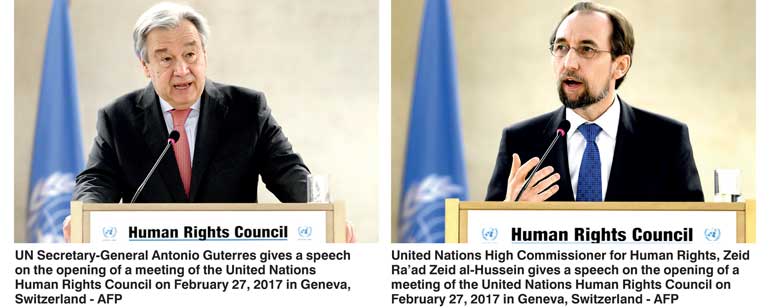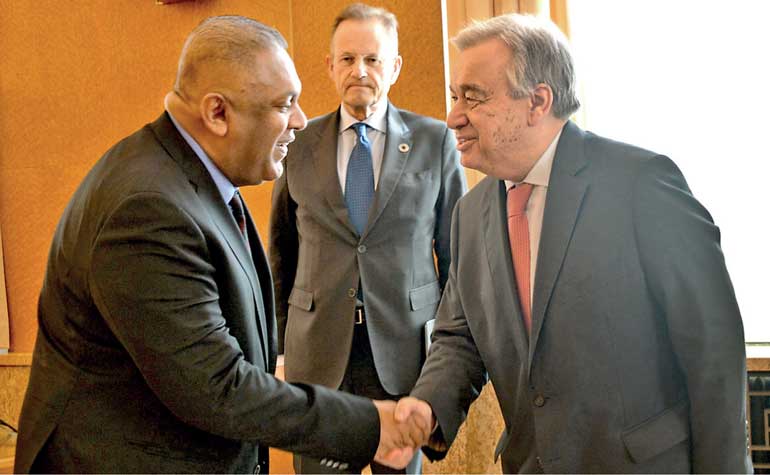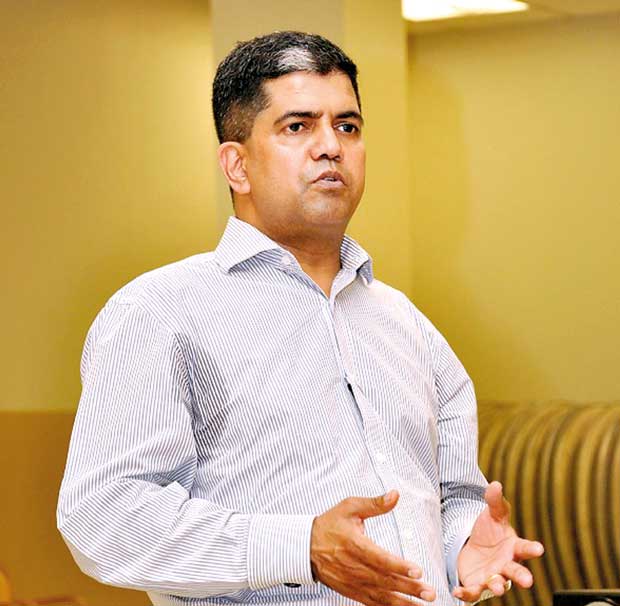A Brief Colonial History Of Ceylon(SriLanka)
Sri Lanka: One Island Two Nations
A Brief Colonial History Of Ceylon(SriLanka)
Sri Lanka: One Island Two Nations
(Full Story)
Search This Blog
Back to 500BC.
==========================
Thiranjala Weerasinghe sj.- One Island Two Nations
?????????????????????????????????????????????????Tuesday, February 28, 2017
UNHRC RESOLUTION: VERY LITTLE HAS BEEN ACHIEVED BY SRI LANKA, SAMPANTHAN TELLS FRANCE

TNA photo: Sampanthan meeting a delegation of Senators from France.
At a meeting with a visiting delegation of Senators from France the
Leader of the Opposition and the TNA, Hon. R. Sampanthan MP told them
that very little had been achieved on the UNHRC 30/1 resolution, which
was cosponsored by the Sri Lankan government.he further said that an an
extension of time to the government to fulfill its commitment to the
resolution should be granted only under strict conditions. He,
nevertheless, asserted that the resolution should be implemented in its
entirety and that the government should take all steps necessary to
ensure reparations, guarantees of non-recurrence, accountability, and
justice.
Full text of the press release follows:
Press Release/ 27 Feb 2017
The Leader of the Opposition and the TNA, Hon. R. Sampanthan MP met with
a delegation of Senators from France at the Opposition Leader’s office
in the Parliamentary complex today (27 Feb).
At the meeting, Mr. Sampanthan briefed the delegation on the
constitutional making process, stating that the new constitution should
possess features that will give more powers to the provincial councils
concerning matters of socio-economic development.
Commenting on the upcoming UN Human Rights Council sessions, Mr.
Sampanthan stated that very little had been achieved on the UNHRC 30/1
resolution, which was cosponsored by the Sri Lankan government.
Mr. Sampanthan also stated that an extension of time to the government
to fulfill its commitment to the resolution should be granted only under
strict conditions. He, nevertheless, asserted that the resolution
should be implemented in its entirety and that the government should
take all steps necessary to ensure reparations, guarantees of
non-recurrence, accountability, and justice.
The France delegation comprised of Mrs Marie-Christine Blandin, Senator
of Nord Department, Chairwoman of the France-Sri Lanka friendship group,
H E Mr. Mean-Marin Schuh, Ambassador of France to Sri Lanka, Mrs.
Mireille Jouve, Senator of Bouches-du-Rhone Department, Mr. Patrick
Chaize, Senator of Ain Department. Mr. Olivier Delamare Debouteville,
Senior advisor. Mrs. Isabeele Miscot, Deputy Head of Mission, Embassy of
France.
State reforms as a domestic policy imperative
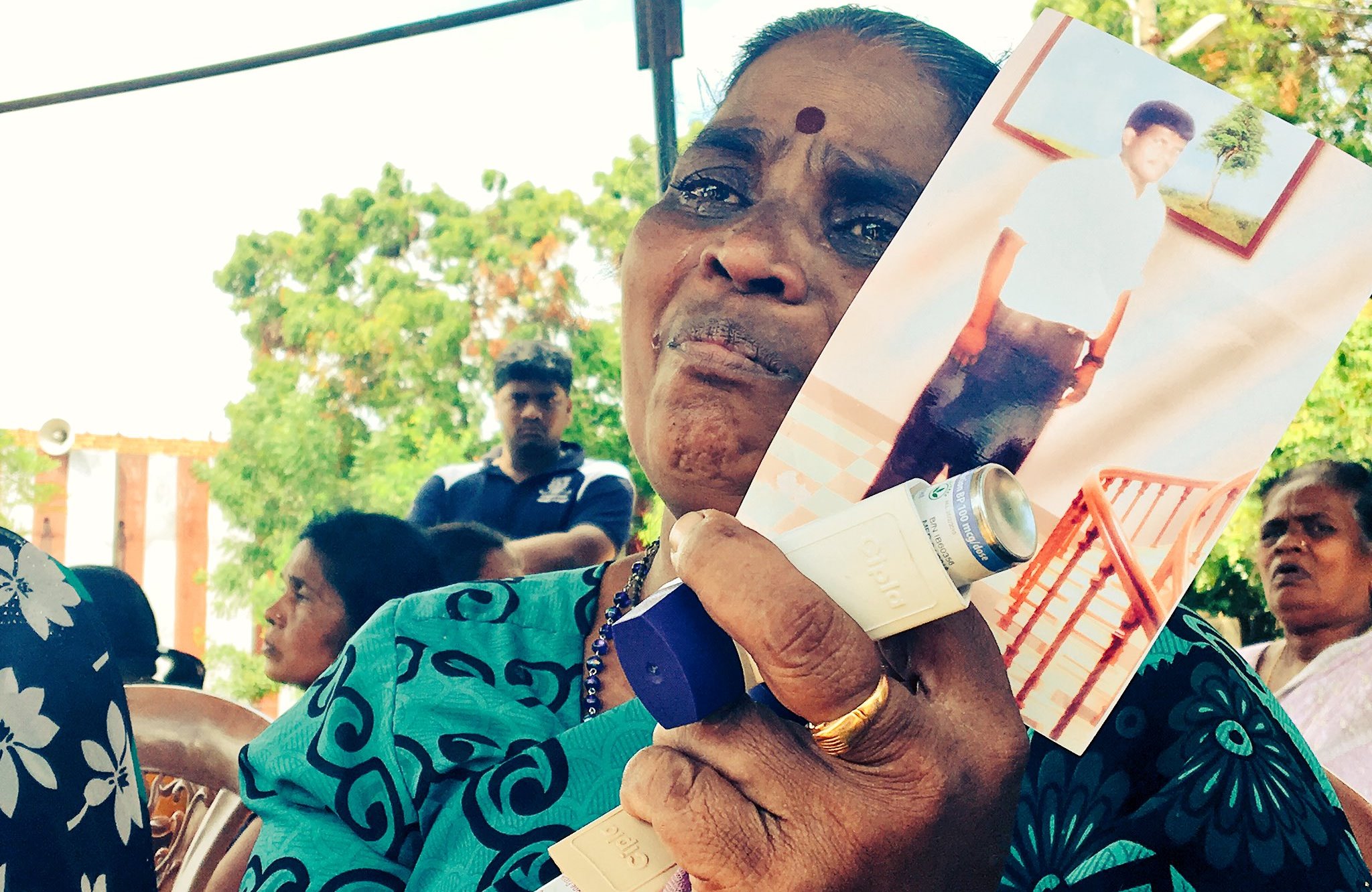
Featured image courtesy Sri Lanka Brief/@UthayaShalin
Earlier this week, Parliament debated, on an adjournment motion by the
TNA, the unresolved issues of the North and East, namely dealing with
the effects and the causes of the war. The former requiring specific
reconciliation measures, and the latter reforms of the Sri Lankan state
which enables the state to accommodate the full diversity of society.
The attention of the Sri Lankan polity will also be focused
internationally at the UNHRC in Geneva, where at its general sessions
the resolution on Sri Lanka, dealing with our reconciliation and
democratisation processes, would be on the agenda. Various reports in
the popular press have a range of views on the reconciliation process
and the current state of play, which broadly divide into two camps. In
the south, opposition forces are agitating that the proposed reforms are
a sell out and have consequently largely resigned from the steering
committee of the Constitutional Assembly, but after having served on the
sub committees during deliberations and the submission of their
reports. In the North, opposition to the TNA leadership, paradoxically,
largely from within its own ranks would claim that little or no progress
on reconciliation has occurred.
The context for the current state of play, is the momentous elections of
2015, which abruptly ended what had seemed an invincible Rajapakse
Administration and its policy direction of creeping authoritarianism and
an entrenching of social divisions and ethnic polarizations. The
elections of President Maithripala Sirisena and Prime Minister Ranil
Wickremesinghe, opened a new chapter, in post war Sri Lanka, a
government committed to the three pillars of democratization,
reconciliation and sustainable economic development. The one hundred
(100) day program of the new government succeeded in achieving the early
wins and the easy tasks and the 19thamendment to the
constitution, was the landmark achievement of that first flush of
victory. The current tasks and challenges are now the harder tasks of
state reform and it is important to bear in mind, why we should reform.
Earlier in this month of February, we celebrated our 69thanniversary
of Independence and casting our minds back to 1948, Ceylon as we were
then called was a land of rich promise. Looking back nearly seven
decades later, we realize that our inability to deal with our diversity
led us spending about three decades fighting a ruinous civil war, which
eroded our democracy, polarised our society, stunted our economic growth
and warped our social progress. It is not in the interest of any
section of Sri Lankan society, that we live our next three decades, like
we did in the last three.
The end of the war and the destruction of the armed capability of the
LTTE in 2009, provided a unique second chance for us to recreate a
united and tolerant Sri Lanka, accommodative of diversity and fulfilling
the aspirations of all her peoples. Unfortunately, the Rajapakse
Administration, which had provided the political oversight for the
military’s defeat of the LTTE, seemed both unwilling and unable to chart
a new course to provide either a peace dividend or a sustainable peace.
It was amazing that in a short span of four to five years, it moved
from an overwhelming victory to an ignominious defeat. The broad rainbow
coalition of the “Yahapaalanaya” Administration was elected on
a good governance and reform agenda, which would seek to utilise the
window of opportunity we have for real and needed state reform.
The most important aspect of reform required by the general public is
economic reform, for a dynamic and growing economy which fulfills the
economic aspirations of all our peoples, including both urban and rural,
young and old, professionals and entrepreneurs, the educated and the
less well educated. The economic management leadership of the current
administration would clearly articulate that they inherited an economy
hobbled with excessive foreign debt spent on projects of dubious value
at exorbitant and inflated costs, which in an unfavorable external
environment has been a near insurmountable challenge to overcome. Well
knowing though that the next election would all be about how economic
benefits were delivered to the people.
The other aspect of needed reform is in the area of reconciliation and
the government is moving in the right direction, though arguably at a
pace slower than that wished by the people of the North and East and
their elected representatives. However, the important fact is that the
Government is on the right path, even if it has not progressed down that
path, at quite the pace wishes by some. Even government leaders may
well be frustrated by the pace of reform, but politics and policy reform
is also the art of the possible, exploiting existing spaces
complemented with comprehensive dialogue among stakeholders and such
democratic processes take time and as the old adage goes, Rome was not
built in a day and societies being complex, change slowly and
incrementally.
Sri Lanka actually achieved a quiet people revolution through the ballot
box in 2015 and started off on a new journey, which has perhaps passed
its one third mark, but not yet reached even the half way stage. It must
be provided the time, space and support, both locally and
internationally to proceed down the path of reforms in democracy,
reconciliation and sustainable economic development, to fulfill the
clear mandates of the sovereign people of Sri Lanka given in January and
August 2015.
Those who enjoyed this article might find “Geneva and coming colours: A lesson for Colombo” and “Sellamma and her struggle to reclaim her house and land in Puthukudiyiruppu,” enlightening reads.
Influencing the polity for constitutional reform

By Jehan Perera-February 27, 2017, 8:30 pm
 Constitutional
reform is once again on the front burner of the national agenda. The
election manifestos of both President Maithripala Sirisena and Prime
Minister Ranil Wickremesinghe in 2015 gave high priority to it. The
government started strongly with passage of the 19th Amendment through
parliament. In an unprecedented act of statesmanship President Sirisena
voluntarily relinquished much of the power he was vested with as
executive president of the country and reduced the term of office of the
president. This was followed by the government appointing a Public
Representations Committee on constitutional reforms comprising leading
public intellectuals drawn from academia and civil society. They were
mandated to canvass the views of the general public on constitutional
reform in a hitherto unprecedented manner.
Constitutional
reform is once again on the front burner of the national agenda. The
election manifestos of both President Maithripala Sirisena and Prime
Minister Ranil Wickremesinghe in 2015 gave high priority to it. The
government started strongly with passage of the 19th Amendment through
parliament. In an unprecedented act of statesmanship President Sirisena
voluntarily relinquished much of the power he was vested with as
executive president of the country and reduced the term of office of the
president. This was followed by the government appointing a Public
Representations Committee on constitutional reforms comprising leading
public intellectuals drawn from academia and civil society. They were
mandated to canvass the views of the general public on constitutional
reform in a hitherto unprecedented manner.
But lately it seemed that constitutional reform was running out of steam
and being put on the back burner. The move to go slow on constitutional
reform was primarily led by the SLFP, the junior partner in the
government coalition. The SLFP is numerically the junior partner despite
having an almost equal number of seats in parliament (95) as compared
to the UNP (106). This is on account of the split in the SLFP with the
greater number of SLFP parliamentarians preferring to give their loyalty
to the Joint Opposition led by former president Mahinda Rajapaksa. Only
about 40 of the SLFP parliamentarians are supporting the government
which is backed by President Sirisena. Therefore, in the government
coalition, the SLFP is numerically the junior partner.
The SLFP is also morally speaking the junior partner in the government
coalition when it comes to constitutional reform. At the last general
elections, most of its MPs campaigned on the same ultra nationalist
platform as the former president. There was little that was redeeming
about their political stance in relation to constitutional reform that
could find a meeting point with ethnic and religious minority
aspirations for equal protection of the law and justice. The SLFP under
the former president had little or no interest in constitutional reform,
except to the extent that it would further concentrate power in the
hands of the ruling party and its leadership. The 18th Amendment to the
constitution passed by the Rajapaksa government gave unlimited terms of
office to the president and gave him unilateral powers of appointment of
all powerful state positions, such as the heads of the judiciary,
public service and police.
OBTAINING CONCURRENCE
The challenge to the government as it contemplates constitutional reform
is to obtain the concurrence of its SLFP component. The problem is that
the SLFP has been in a state of nationalist regression for over a
decade. Even SLFP members who now support President Sirisena and are a
part of the coalition government feel uncomfortable to advocate concepts
such as devolution of power and minority rights which they saw being
politically and ideologically nullified during the period of the
previous government. As a result they feel more comfortable to advocate
concepts such as national sovereignty, national security and the
centralization of power on the basis of their perception that the ethnic
and religious minorities constitute a threat along with the
international community. They also do not wish to go before the people
at a referendum to obtain the people’s backing for concepts they do not
really believe in.
It is in these circumstances that President Sirisena has been falling
short of making a positive contribution to those political reforms that
require a change in the status quo. The president recently and publicly
acquiesced to regressive tendencies in society that denounced the
decriminalization of same sex relationships. This is indicative of the
conservative and nationalist elements that have surrounded him. It is
these same conservative and nationalist elements that oppose
constitutional reforms that will empower and dignify the ethnic and
religious minorities. Sri Lanka needs to become a tolerant and
enlightened polity that embraces and dignifies all sections of its
people, rather than one that excludes and denounces some of them,
through the provision of devolution of power and the equal protection of
the laws. This is not an impossible task because Sri Lankan society, as
against its polity, is more oriented towards inclusion and tolerance
than towards exclusion and intolerance.
It is important that President Sirisena should be encouraged to actively
support the constitutional reform process as he has credibility with
the ethnic and religious majority whose ethos he shares. However, as
president of Sri Lanka he also needs to extend himself to include the
ethnic and religious minorities and indeed the sexual minorities in his
care, protection and commitment. Sri Lanka is fortunate that at the
present time its top leadership, notably the president and prime
minister are both people who are widely held to be non-chauvinist in
their fundamental value systems. The president can be encouraged and
strengthened by the outcome of civil society engagements that highlight
the positive political potential in Sri Lankan society for inter ethnic
and inter religious goodwill and amity that feed into support for the
constitutional reform process.
RELIGIOUS GATHERING
Last week about 360 religious leaders, civil society activists and
government officials attended a National Inter Religious Symposium
organised by the National Peace Council which is a non governmental and
civil society organisation. This brought together sixteen District Inter
Religious Committees (DIRCs) comprising religious, civil organizations
and community leaders that have been established in the districts of
Kalutara, Galle, Matara, Hambantota, Kandy, Nuwara Eliya, Puttalam,
Kurunegala, Jaffna, Mannar, Batticaloa, Ampara, Polonnaruwa,
Anuradhapura, Ratnapura and Badulla. The major task of the DIRCs is to
strengthen reconciliation building action among the various religious
and ethnic communities based on the transitional justice process that
seeks to ensure that there is truth, accountability, reparations and
institutional reforms in the ongoing political process.
Former President and Chairperson of the Office for National Unity and
Reconciliation Chandrika Kumaratunge who participated in the event
stressed that reconciliation would not be successful without
relationships between the religions in the country. She commended civil
society organisations for working to bring religious leaders to work
together."All organisation for reconciliation must get together and work
on a long term basis," she said, pointing out that most politicians
were sometimes opportunistic and neglected the importance of solving
problems. She also used the opportunity to urge the government to carry
out its promise to formulate a new constitution, adding that it should
go beyond the 13th amendment in terms of the devolution of power.
In the backdrop of imminent constitutional reforms possibly leading to a
referendum, the members of the religious clergy of all religions and
civil society activists from across the country who met at the country’s
premier conference hall, the BMICH, urged the government to take
concrete steps to ensure that peace and reconciliation were established
in post war Sri Lanka. They also handed over a six-point resolution to
the Minister of National Co-existence Dialogue and Official Languages
Mano Ganesan, Chairperson of the Office for National Unity and
Reconciliation Chandrika Kumaratunge and Secretary-General of the
Secretariat for Coordinating Reconciliation Mechanisms Mano Tittawella.
PEOPLE’S RESOLUTION
The joint resolution was more comprehensive than a mere technical
document, and was born out of the life experiences of the participants.
It urged the government to bring back to normalcy the lives of people
who have been evicted from their homes and properties, pointing out that
many of them are without homes or incomes even today. It stated that
civil administration should be strengthened in keeping with the 19th
Amendment because security forces still intervene in civil
administrative activities and this hinders the freedom of life of the
people in these areas. They added that the lethargic manner of working
by certain government officials has hindered the improvement of
infrastructure facilities and provision of various essential services.
They also said that there has not been specific and speedy action on
missing persons and those who have been made to disappear illegally and
asked for a compensation process without any form of discrimination.
The resolution pointed out that extremist political activity and
extremist religious groups and individual activities were destabilizing
society and called for several measures to avoid such situations such as
the establishment of social protection monitoring committees,
strengthening the action of the Women and Child Protection Committees
and conducting formal counselling services aimed at those subject to
severe mental stress.
The final point in the resolution suggested several steps for building
national reconciliation including implementing the national language
policy and paying attention to activities that will improve
inter-relationships among the communities. "If there are political
groups, religious groups, government officials, civil society actors who
will disrupt reconciliation, take legal action against them unmindful
of their status," the resolution said. The government needs to act on
these exhortations that emerged from the larger religious community
itself and are in the best interests of the country. This will be in
accordance with the higher principles of democracy. The indications are
that the great majority of Sri Lankan people will vote for justice and
reconciliation to be the birthright of all citizens if given the
opportunity at a referendum.
Mangala to deliver Sri Lanka’s national statement in Geneva today
 Dharisha Bastians -Tuesday, 28 February 2017
Dharisha Bastians -Tuesday, 28 February 2017
reporting from Geneva
Foreign Minister Mangala Samaraweera will address the United Nations Human Rights Council in Geneva today, delivering a speech that will outline Sri Lanka’s reconciliation and justice efforts since 2015 and appeal for more time to deliver on its transitional justice pledges as the country reckons with its violent past.
Sri Lanka is likely to seek a two-year extended timeframe to implement recommendations contained in UNHRC resolution 30/1 which it cosponsored in October 2015. The resolution called on the Government to meet its transitional justice commitments, undertake political and security reforms and set up a judicial mechanism comprising foreign judges, lawyers and investigators to address alleged war crimes committed by Government troops and the LTTE during the conflict.
Yesterday, Minister Samaraweera held talks with UN Secretary General Antonio Guterres who was in Geneva to open the 34th Session of the Human Rights Council. Secretary General Guterres was addressing the UN Human Rights Council for the first time since taking office in January this year. It was also the Sri Lankan Foreign Minister's first meeting with the UNSG.
Minister Samaraweera briefed the Secretary General on Sri Lanka's reconciliation efforts, and Gueterres expressed his full support for the Government's reform agenda, the Foreign Minister's office said in a statement. Recalling his several visits to Sri Lanka since 1978 including as High Commissioner for Refugees, the Secretary-General said that Sri Lanka was "a country that very dear to his heart," the statement said adding that the Secretary General had indicated he would be delighted to visit the island.
The Foreign Minister is scheduled to meet with UN High Commissioner for Human Rights, Zeid Ra’ad Al Hussein today, after he delivers Sri Lanka’s national statement before the council.
Minister Samaraweera and Secretary General Tittawella will also address an event organised by the Permanent Mission of Sri Lanka to the UN on the sidelines of the UNHRC session tomorrow (1).
The Sri Lankan delegation attended the council’s opening session at the Palais des Nations yesterday. The delegation, led by Minister Samaraweera, also included Parliamentarian Dr. Jayampathy Wickremaratne, Sri Lanka’s Permanent Representative to the United Nations in Geneva, Ambassador Ravinatha Aryasinha and Secretary General of the Secretariat for Coordinating Reconciliation Mechanisms, Mano Tittawella.
The UN Human Rights Council’s 34th Session opened yesterday, even as reports over the weekend indicated that under the Trump administration, the US was considering a withdrawal from the 47- member council. The new administration in Washington was questioning the UNHRC’s usefulness and believes the body in which the US holds membership to be unfairly targeting Israel, the reports said.
Addressing the UNHRC opening session in Geneva yesterday, both UN Secretary General Guterres and High Commissioner Zeid took note of the rise of populism across the world that was threatening the international order and undermining the rights of refugees, migrant and minority communities.
“We are increasingly seeing the perverse phenomena of populism and extremism,” resulting in growing racism, xenophobia, anti-Semitism and anti-Muslim hatred, the UN secretary general said as he opened the council’s session in Geneva.
In his opening statement High Commissioner Zeid issued a clarion call to the world to protect the international order and the multilateral system and understand its importance towards maintaining world peace and protecting human dignity.
The High Commissioner’s comments before the 47-member Council were a thinly veiled broadside at the new administration in the United States.
“The unprecedented marches of 21 January this year were not, I believe, about a particular individual or government – although many saw them as such. I believe the marches were for the rights of women, the human rights of women, for all of us, for a fair and inclusive humanity,” the High Commissioner said in a reference to the post-inauguration marches in the US that were mirrored in other parts of the world.
Human Rights and the very future of the planet must not be thrown aside by “reckless political profiteers”, the High Commissioner said in his strongly worded statement.
He underscored that without a commitment to fundamental human rights, to the dignity and worth of the human person and to the equal rights of men and women and of nations large and small, the world would descend into chaos, misery and warfare.
“To those political actors who, as in the days of the league, threaten the multilateral system or intend to withdraw from parts of it, the sirens of historical experience ought to ring clear. We will not sit idly by. For we have much to lose, so much to protect,’ the UN’s top Human Rights Envoy vowed.
 Dharisha Bastians -Tuesday, 28 February 2017
Dharisha Bastians -Tuesday, 28 February 2017reporting from Geneva
Foreign Minister Mangala Samaraweera will address the United Nations Human Rights Council in Geneva today, delivering a speech that will outline Sri Lanka’s reconciliation and justice efforts since 2015 and appeal for more time to deliver on its transitional justice pledges as the country reckons with its violent past.
Sri Lanka is likely to seek a two-year extended timeframe to implement recommendations contained in UNHRC resolution 30/1 which it cosponsored in October 2015. The resolution called on the Government to meet its transitional justice commitments, undertake political and security reforms and set up a judicial mechanism comprising foreign judges, lawyers and investigators to address alleged war crimes committed by Government troops and the LTTE during the conflict.
Yesterday, Minister Samaraweera held talks with UN Secretary General Antonio Guterres who was in Geneva to open the 34th Session of the Human Rights Council. Secretary General Guterres was addressing the UN Human Rights Council for the first time since taking office in January this year. It was also the Sri Lankan Foreign Minister's first meeting with the UNSG.
Minister Samaraweera briefed the Secretary General on Sri Lanka's reconciliation efforts, and Gueterres expressed his full support for the Government's reform agenda, the Foreign Minister's office said in a statement. Recalling his several visits to Sri Lanka since 1978 including as High Commissioner for Refugees, the Secretary-General said that Sri Lanka was "a country that very dear to his heart," the statement said adding that the Secretary General had indicated he would be delighted to visit the island.
The Foreign Minister is scheduled to meet with UN High Commissioner for Human Rights, Zeid Ra’ad Al Hussein today, after he delivers Sri Lanka’s national statement before the council.
Minister Samaraweera and Secretary General Tittawella will also address an event organised by the Permanent Mission of Sri Lanka to the UN on the sidelines of the UNHRC session tomorrow (1).
The Sri Lankan delegation attended the council’s opening session at the Palais des Nations yesterday. The delegation, led by Minister Samaraweera, also included Parliamentarian Dr. Jayampathy Wickremaratne, Sri Lanka’s Permanent Representative to the United Nations in Geneva, Ambassador Ravinatha Aryasinha and Secretary General of the Secretariat for Coordinating Reconciliation Mechanisms, Mano Tittawella.
The UN Human Rights Council’s 34th Session opened yesterday, even as reports over the weekend indicated that under the Trump administration, the US was considering a withdrawal from the 47- member council. The new administration in Washington was questioning the UNHRC’s usefulness and believes the body in which the US holds membership to be unfairly targeting Israel, the reports said.
Addressing the UNHRC opening session in Geneva yesterday, both UN Secretary General Guterres and High Commissioner Zeid took note of the rise of populism across the world that was threatening the international order and undermining the rights of refugees, migrant and minority communities.
“We are increasingly seeing the perverse phenomena of populism and extremism,” resulting in growing racism, xenophobia, anti-Semitism and anti-Muslim hatred, the UN secretary general said as he opened the council’s session in Geneva.
In his opening statement High Commissioner Zeid issued a clarion call to the world to protect the international order and the multilateral system and understand its importance towards maintaining world peace and protecting human dignity.
The High Commissioner’s comments before the 47-member Council were a thinly veiled broadside at the new administration in the United States.
“The unprecedented marches of 21 January this year were not, I believe, about a particular individual or government – although many saw them as such. I believe the marches were for the rights of women, the human rights of women, for all of us, for a fair and inclusive humanity,” the High Commissioner said in a reference to the post-inauguration marches in the US that were mirrored in other parts of the world.
Human Rights and the very future of the planet must not be thrown aside by “reckless political profiteers”, the High Commissioner said in his strongly worded statement.
He underscored that without a commitment to fundamental human rights, to the dignity and worth of the human person and to the equal rights of men and women and of nations large and small, the world would descend into chaos, misery and warfare.
“To those political actors who, as in the days of the league, threaten the multilateral system or intend to withdraw from parts of it, the sirens of historical experience ought to ring clear. We will not sit idly by. For we have much to lose, so much to protect,’ the UN’s top Human Rights Envoy vowed.
Foreign Minister Mangala Samaraweera who is presently in Geneva
to participate in the High-Level segment of the 34th Session of the UN
Human Rights Council met UN Secretary-General Antonio Gueterres
yesterday. This was the first meeting of the Minister with the new UN
Secretary-General who took office in January this year. Recalling his
several visits to Sri Lanka from 1978 onwards including as High
Commissioner for Refugees, the Secretary-General said that Sri Lanka is a
country that is very dear to his heart. Minister Samaraweera briefed
the Secretary-General on recent developments in Sri Lanka in the context
of reconciliation. Expressing the full support of the United Nations
for the Government’s reform agenda, the Secretary-General expressed that
Sri Lanka is a country that is very dear to his heart and that he would
be delighted to visit.
“We are hopeful of a political solution” - GTF
With the commencement of the UNHRC session featuring Sri Lanka’s case among others, Suren Sirendiran, the spokesperson for Global Tamil Forum, a leading Tamil Diaspora Organisation, articulates the implementation of its resolution, action regarding alleged war crimes and the way forward. The interview conducted by email:
 Ahead of the UNHRC session, how do you analyze the progress made by the government in addressing your aspirations?
Ahead of the UNHRC session, how do you analyze the progress made by the government in addressing your aspirations?
Progress is dead slow and minimal.
It is now obvious that Sri Lanka wouldn’t have made any significant progress by March 2017 in implementing the UNHRC resolution that it co-sponsored. Therefore, it is inevitable that Sri Lanka will request an extension to the timeline. It will only be conceivable that the member states will agree to extend, through a new rollover resolution.
Status of implementation of the Resolution A/HRC/30/L.29 by the Government of Sri Lanka will still be work in progress. Therefore, until full implementation of the resolution, somehow Sri Lanka must remain in focus for the Human Rights Council. If that formal focus and monitoring can only be delivered via another resolution, then that is what should happen.
It is now obvious that Sri Lanka wouldn’t have made any significant progress by March 2017 in implementing the UNHRC resolution that it co-sponsored. Therefore, it is inevitable that Sri Lanka will request an extension to the timeline. It will only be conceivable that the member states will agree to extend, through a new rollover resolution.
Status of implementation of the Resolution A/HRC/30/L.29 by the Government of Sri Lanka will still be work in progress. Therefore, until full implementation of the resolution, somehow Sri Lanka must remain in focus for the Human Rights Council. If that formal focus and monitoring can only be delivered via another resolution, then that is what should happen.
We are hopeful of a political solution.docx by Thavam Ratna on Scribd
Trying To Understand Keppapilavu: Resistance, Solidarities & Politics

By Mahendran Thiruvarangan –February 28, 2017
For the past twenty-eight days, Tamil people of Keppapilavu and
Puthukkudiyiruppu in Mullaitivu district including women and children
have been protesting against the authoritarian occupation of their
homelands by the Sri Lankan military and Air Force. These people who
were displaced during the civil war wish to go back to their homes and
lands. To return to and resettle in places where they had been living
for decades is not just these people’s wish but it is their right too.
The state and the military cannot encroach on this right and deny the
people their homes, lands and the environment that had been an integral
part of their lives prior to their displacement. Eighty-four families,
of which thirty are women-headed, have been denied entry into their
lands in Keppapilavu by the military.
At the protest, a woman, one of the dwellers says (through a video
film): “the leader fought for a separate state but gave our country to
the Sinhalese. Now the Sinhalese are ruling our country and we are
wandering the streets.” The landlessness that the people are facing
today is also an outcome of the LTTE’s ill-conceived insurgency against
the state that put the lives and livelihood of these people under great
risk. The LTTE dragged the people down the road to doom and destruction
during the last stages of the war in 2008/2009. Lacking strategy and
concern for the thousands of lives trapped in the war zone, the LTTE
continued its assault on a rapidly advancing military. In the absence of
any alternative routes to save their lives from the military onslaught,
the people including those in Keppapilavu and Puthukkudiyiruppu left
their homes and lands and moved out further east towards the coast.
Later the military to brought these lands under their control and
prevented the displaced people from resettling in them. The LTTE
leadership’s suicidal politics and mindless militarism also contributed
to the plight of these people today.
The displaced people were transferred to various IDP camps and later
given alternative lands where the military built houses for them. But
the people find these houses unsuitable and unhygienic. Above all, the
people like to go back to their village where the community, as one of
the protestors describes, “had lived happily like one extended family
till 2008” (people’s narratives about their displacement, resettlement
and the struggle to reclaim their lands appear in a recent Tamil
publication by the Vithai Group).
Freed from the totalitarian and militarized culture that had dominated
Tamil politics till May 2009, the Tamil community today is able to
choose modes of resistance that are constructive and creative. The
relatively freer civic space opened up post-2015 also facilitated the
people to launch their protests fearlessly. The classes conducted at the
protest venue for the school children mark a resistance that is
cognizant of the needs and aspirations of the future generations,
forming a sharp contrast to the land reclamation struggle waged by the
LTTE where many child recruits from the rural North and East were given
guns and cyanide capsules against their wish and despite their parents’
opposition. At the forefront of the struggle are women from the
community. The songs of solidarity sung by women of different ethnic
communities outside the tents where the women and children are living
and the paintings by the children depicting their present predicament
have breathed fresh air into the culture of people’s resistance in
post-war North.
The Sri Lankan state has confiscated lands belonging to its polity in
the name of national security, development, urban planning and
environmentalism in various parts of the country. In the North and East,
many areas including parts of Valikamam North, Sampur and Musali and
Morakotanchenai, Keppapilavu and Puthukkudiyiruppu continue to be
occupied by the military. The moves to build a coal power plant in the
land expropriated in this manner in Sampur in the East and the attempts
by the state to alienate land for development initiatives including
tourism and urban development in places like Panama in Ampara district
and Slave Island in Colombo in the past confirm that land alienation in
the country is also linked to the class-based interests of powerful
national and international forces.
The continuing presence of the military in the North and East indicates
that the different regimes that have ruled Sri Lanka for the past three
decades have treated this Tamil-majority region as their internal
colony. Militarization keeps the people of this region under constant
surveillance and fear curtailing their movement and activism. The
confiscation of the lands in the North and East that belong to the
people should therefore be seen as a part of the ongoing militarization.
Giving protection to a majoritarian state that conquers the lands
belonging to and used by the predominantly minority communities and
constructing Buddhist structures and symbols in some of those lands, the
military is actively involved in a certain form of Buddhisization in
the North and East.
The state’s attempt to declare lands belonging to Musali in Mannar
district as an environmental protection zone when the people evicted by
the LTTE in 1990 were trying to resettle in those lands after the war
demonstrates that land alienation in the North and East is a problem
that affects the Muslim community too. In Panama, the lands acquired by
the military and later used for tourism purposes had belonged to a
community of mixed ethnic origins in the region. The lack of interest on
the part of the Tamil bureaucrats and politicians in the North in
supporting the resettlement of the Muslims suggests that the Tamil elite
are hardly any different from the Sinhala-Buddhist state in their
treatment of the minorities and their problems related to resettlement
and landlessness.
Kepapaulavu and Pudukuduirippu: President assures release of lands within 2 days
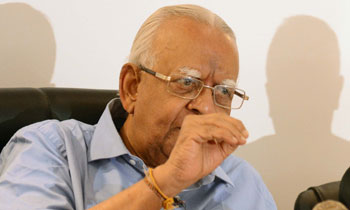
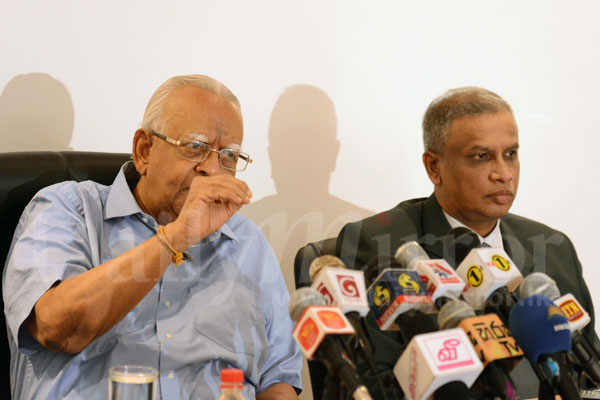
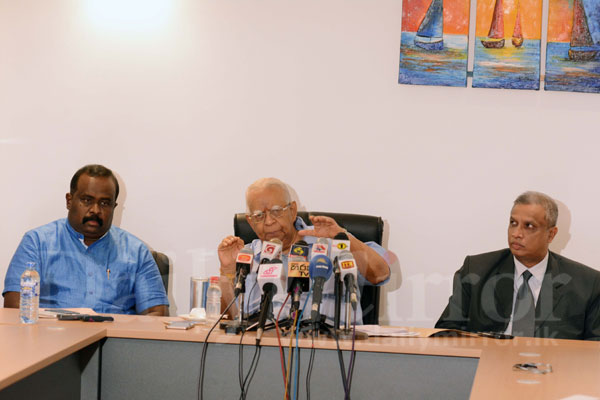
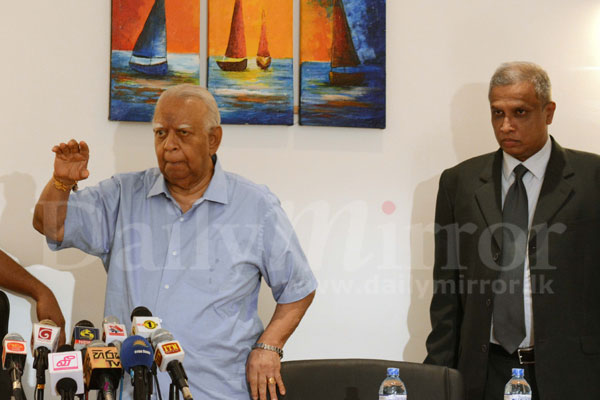
 2017-02-28
2017-02-28
President Maithripala Sirisena has assured that the lands in Kepapaulavu and Pudukuduirippu will be handed over to the people in the area within two days, Opposition Leader R Sampanthan said yesterday.
Mr Sampanthan told a media briefing last evening that the President gave this assurance when the TNA MPs met him last afternoon.
“Some 54 families in Kepapaulavu have been given permits and 42 of them are reported to be in order according to investigations carried out by the Government Agent. Therefore these families will have to decide whether they are going to reside in these lands in Kepapaulavu or whether they want to go back to their original lands,” Mr Sampanthan said
. “When it comes to Pudukuduirippu the land will be given to 16 families when the army vacates the area after finding alternative land,” he added.
The opposition leader said the President contacted the Army Commander, the acting secretary of defence and other local authorities in their presence and directed them to release all lands within two days. (Yohan Perera and Lahiri Pothmulla)




 2017-02-28
2017-02-28President Maithripala Sirisena has assured that the lands in Kepapaulavu and Pudukuduirippu will be handed over to the people in the area within two days, Opposition Leader R Sampanthan said yesterday.
Mr Sampanthan told a media briefing last evening that the President gave this assurance when the TNA MPs met him last afternoon.
“Some 54 families in Kepapaulavu have been given permits and 42 of them are reported to be in order according to investigations carried out by the Government Agent. Therefore these families will have to decide whether they are going to reside in these lands in Kepapaulavu or whether they want to go back to their original lands,” Mr Sampanthan said
. “When it comes to Pudukuduirippu the land will be given to 16 families when the army vacates the area after finding alternative land,” he added.
The opposition leader said the President contacted the Army Commander, the acting secretary of defence and other local authorities in their presence and directed them to release all lands within two days. (Yohan Perera and Lahiri Pothmulla)
Sri Lanka: On The Road To Ruination

What do we see today in the political arena is nothing but slogans and battle cries to say that we have to form a joint opposition to defeat other political parties – Meaning they have no interest in joining for the development and progress of the country. Their main aim is to propagate the defeat of another political party.

by Zulkifli Nazim-
( February 27, 2017, Colombo, Sri Lanka Guardian) Our
Beloved country, Sri Lanka is being destroyed, ruined and bungled up by
partisan politics – hyper-partisanship to the point where it becomes so
recalcitrant and impenetrable and inflexible that no compromise is
possible. Greedy Politicians who are involved in making this mess, as
you can see, are stubbornly resistant to authority and control; and the
president does nothing to take any form of action to penalize or impose a
penalty on all those who despoil, destroy and strip off decency of it’s
possession.
To add fuel to fire, President Maithripala Sirisena, is inviting all those despots to join him to achieve greater success.
And moreover, the supposedly Justice system which will have no political
influence according to the President- where The High Court issues an
order to allow Wimal Weerawansa to attend Parliament and to participate
in the parliamentary working committee. A man who has three Birth
Certificates, three Passports, misusing 40 Government vehicles and
various other accusations, whose actions tantamount to treason, is being
granted freedom to attend parliament.
What is that he can contribute to the development and progress of our
nation? What does this action by our justice system prove? inviting all
despots and rattlesnakes to join the President for the progress of this
country.?”
It would indeed be wise for our President to use some advise from the
then President of the United States of America Franklin D. Roosevelt
when he said, with regard to Hitler the fascist :
“But when you see a rattlesnake poised to strike, you do not wait until he has struck before you crush him.”
It is imperative that all those who are under suspicion, investigation
and those who have been jailed or remanded be strictly prohibited from
attending the august legislative body – That is the general opinion of
decent people of this country, for the greater good.
What do we see today in the political arena is nothing but slogans and
battle cries to say that we have to form a joint opposition to defeat
other political parties – Meaning they have no interest in joining for
the development and progress of the country. Their main aim is to
propagate the defeat of another political party.
It looks like there is encouragement all-round – the joint opposition
together with the supporters of the President in the government, an evil
conspiracy, to achieve their purpose successfully
All those whose who are vulgarizing disinformation, including members of
his cabinet, are intentionally diffusing false and inaccurate
information to spread deliberately. It is an act of deception and false
statements to convince untruths – vis-à-vis when the President announces
that he supports the change of the constitution, a cabinet minister
says that they will not. This is airing willful ignorance.
It’s a kind of vulgar indecency that embodies arrogance, narcissism,
rigidity, narrow-mindedness, xenophobia and fear that is already
expressing itself in the form of violence, and perhaps an unearned sense
of entitlement, just a few expressions to describe the psyche of those
who were under a kakistocracy – the word which is used to describe a
government in which the worst persons were in power.
We would ask the President : “What happened to the pledge he made on the
revered remains of the Most Venerable Maduluwawe Sobitha Thero, the
chief incumbent of the Kotte Naga Maha Vihara and Convenor and
Chairperson of the National Movement for a Just Society in Sri Lanka?”
It is encouraging to note that the ITN has discussions with a panel of
highly educated and wonderful scholars like, the most Ven. Dambara Amila
Thero, Faculty of Humanities & Social Sciences, University of Sri
Jayewardenepura, Gamini Veyangoda, together with Sarath Wijesooriya,
Saman Ratnayake, Janaranjan who are totally dedicated to stand-up for
and behalf of the 6.2 Million People who brought about this change
urged, advocated and encouraged by the Most Venerable Sobitha Thero, for
they are the voice of those who brought this change in the name of
Justice.
Our President should well remember that these voices cannot be ignored.
By Nagananda Kodituwakku –February 27, 2017
 Dishonest
SLFP and UNP MPs have already conceded that they have abused government
tax revenue under the guise of tax-free permits. The State Minister of
Finance recently said that he has been doing it for a long time whilst
Bandula Gunawardane, MP declared that there is nothing new about
cash-trapped MPs selling their car permits. MP Udaya Gammanpila was also
caught red handed after the vehicle imported on his permit registered
by a private company.
Dishonest
SLFP and UNP MPs have already conceded that they have abused government
tax revenue under the guise of tax-free permits. The State Minister of
Finance recently said that he has been doing it for a long time whilst
Bandula Gunawardane, MP declared that there is nothing new about
cash-trapped MPs selling their car permits. MP Udaya Gammanpila was also
caught red handed after the vehicle imported on his permit registered
by a private company.
The JPV MPs on other hand talk about integrity and morality in politics
claiming that they are committed to preserve and protect the public
property and to combat corruption. They make always make noise in the
parliament about the waste and corruption in the government business.
Now evidence in the public domain reveals that all JVP MPs are trapped
in the Finance Minister, Ravi Karunanayake’s tax-free car permits and Rs
100,000/- bonanza offered to lure MPs to please them and to keep them
under control.
Colombo Telegraph already revealed that all JVP MPs,
includling Anura Kumara Dissanayake, have made use of the tax-free MP
permits offered by Finance Minister Ravi Karunanayake to import 6 Toyota
Hilux vehicles, which they have imported and cleared out of Customs on
the same date.
Sole Authority in Control of Finance
It is deemed that the Head of the COPE Sunil Handunneththi and other JVP
MPs are aware about the Parliament’s authority in the Public Finance as
sets out in the Constitution, which states that no tax or levy can be
charged or any levy already imposed on any commodity can be exempted
except upon the authority of a law enacted by the Parliament.
Issuance of tax-free car permits
However, it is observed that all tax-free car permits for MPs have been
issued in February and March 2016 with no legal sanction whatsoever,
authorizing the exemption of statutory levies chargeable on the
vehicles. For instance all 6 permits issued to JVP MPs have been issued in February/March 2016.
This was a deliberate ploy on the part of the government and it never
expected any one to question the legitimacy of the issuance of permits.
After this issue was raised for the first time, the Finance Minister issued a gazette notification on 02nd May 2016,
legitimizing of the issuance of tax-free car permits, which was done
under the provisions of Excise (Special Provisions) Act No 13 of 1989.
However, by then all permits have been issued in February/March 2016,
which were invalid for want of legitimacy.
Investigation conducted into the gross abuse of public funds through
these permits have revealed that already 38 private individuals have
imported and registered expensive vehicles on these invalid permits in
the names of several Ministers and MPs. It was also revealed that more
than 100 vehicles have been imported on these permits and a large number
of such vehicles are been used by their new owners in the name of the
permit holder MPs, without effecting the transfer, which is also
prohibited and amounts to a punishable offence under Section 12 of the
Motor Traffic Act.
The law requires the new keeper/owner to apply within fourteen days
after change of possession to be registered, as the new owner shall be
guilty of a criminal offence with power conferred on police to detain
such vehicles use on a road.
A clear case of betrayal of people’s sovereign rights by the MPs and Ministers
Further to in-depth investigation into this day light robbery it was
duly reported to the Corruption Commission with overwhelming evidence of
the abuse of public funds for unjust enrichment by the corrupt MPs and
Cabinet of Ministers in the 8th Parliament. Under the law the Corruption
Commission is required to carry out an independent and credible
investigation into this complaint, which however never occurred,
compelling the Corruption Commission to be charged before the Supreme
Court for condoning Corruption.
Further to the filling of this writ application (SC/Writs/07/2016)
Notices have been issued on the Corruption Commission and on three
Commissioners and the matter is now fixed for hearing on 16th March
2017.
A top government official alleged that he suspects a mafia working to block renewable energy sources in the country.
Renewable Energy Sources In The Country A Necessity
by Ifham Nizam - Monday, February 27, 2017
- Mini hydro plants may have a negative impact for the surrounding biodiversity, particularly the fauna and flora
- Sri Lanka dreams of becoming an energy self-sufficient nation
- Shallow reservoirs are not unlike paddy fields which are known to contribute substantially to methane emissions, a greenhouse gas 25 times more potent than carbon dioxide
 A top government official alleged that he suspects a mafia working to block renewable energy sources in the country.
A top government official alleged that he suspects a mafia working to block renewable energy sources in the country.
Chairman of the Sri Lanka Sustainable Energy Authority (SLSEA) Eng.
Keerthi Wickramaratne who is an ardent nature lover and works for the
betterment of the environment firmly denied that they had given any
approval for mini hydro plants that would have a negative impact for the
surrounding biodiversity, particularly the fauna and flora.
He also said that they are often puzzled as to how fish enter areas
after a project commences. He warned that they would investigate such
matters.
He stressed that nobody likes to disturb the environment while adding
that initial construction does have some impact where they have clearly
been instructed to strictly adhere to instructions, keeping in mind that
sustainability comes first. He also emphasized that renewable energy is
the only option to overcome power cuts and blackouts.
Wickramaratne was optimistic that the only way out of this issue was to
make a gradual switch to renewable sources of energy. He stressed that
with assistance from developed countries, a switch to renewable energy
was a possibility. “Computerised systems and other costs will arise, but
switching to renewable sources was a positive move. He said that in
this regard Germany has come forward to assist Sri Lanka in the future
projects.
“Solar and wind power were the best options for renewable energy sources
in Sri Lanka; solar power is a good option. If we increase the use of
solar power then costs will decrease, while in the long-term it will be
cheaper and most importantly, environment-friendly” he said.
However, Wickramaratne said storage of solar power might be a problem
due to various issues. He also noted that offshore sea currents were a
viable option “But we have not yet developed it to be used as a
renewable energy source,” he added.
Power and Renewable Energy Deputy Minister Ajith P. Perera says power
cuts would have to be imposed if mini power plants don’t contribute to
the power generation. Responding to recent allegations by a group of
environmentalists, he said that small hydro power plants being built in
Sri Lanka severely damage the environment and biodiversity. According to
him, the power requirement of Sri Lanka is 4000 megawatts and small
hydro power plants provide 300 megawatts to the national grid.
Ministry of Power and Sustainable Energy Secretary, Dr Suren Batagoda
said that mini hydro power plants are one of the best resources and best
options to Sri Lanka especially in keeping with the government
renewable policy initiatives. “These projects are definitely beneficial
to our country. If not, we would not have any fuel and we would have to
rely on wind, solar and hydro power. Our dream is to become an energy
self-sufficient nation. Of course, there is a certain amount of
environmental damage done during the construction phase. Therefore, we
have suggested the CEA identifies all sensitive waterfalls and gazettes
them. Thereafter the remaining waterfalls could be utilized for the
projects. The only issue is that people are not working together.
Sometimes the developer is trying to find money and there is minimum
coordination between the people and the developers,” he said.
The government should be cautious when implementing hydro power projects in the near future, warns a senior environmentalist.
Dr. Raveendra Kariyawasam, Ecology Management, Centre for Environment
and Nature Study told The Sunday Leader that though the government has
given the prime focus on renewable energy especially stressing the
importance of clean energy, the adverse impact to the environment should
also be taken into consideration. He stressed that small hydro power
plants cause damage to the ecosystem. A study carried out by the
University of Sheffield in the United Kingdom showed that small
hydropower plants has caused damage to ecosystems, destroying aquatic
fauna and flora. “There are many other studies showing the damage caused
by small-scale hydropower plants and the Ministry Agriculture and
Environment. They must pay heed and conduct thorough assessments before
granting approvals and must work hard to revive aquatic ecosystems
already destroyed,” he further said.
He also noted that as a tropical country, Sri Lanka has enough sunshine
and wind. These are the ideal renewable energy sources that the
government must exploit. He also said that the belief that ‘small’
hydropower systems are a source of clean energy with little or no
environmental impact is driving a growing interest in mini, micro, and
pico hydropower systems that can generate from less than five kilowatts
up to 10 megawatts of energy.
Hydropower may appear to be the cleanest and most versatile of renewable
energy sources, but experience shows that optimism about its potential
can be misplaced. Hydropower uses water to generate carbon-free
electricity. Fossil-fuelled power plants and coal power plants, nuclear
power plants produce gases and/or ash emissions in to the air. After
1950 hydropower became popular in many countries including Brazil,
China, Sri Lanka, India, and Malaysia. Many small and large-scale dams
have been built through natural waterways. In Sri Lanka, Randenigala,
Rantambe, and the Victoria dam are some examples of this.
“When building the above mentioned dams the Government of Sri Lanka
(GOSL) made many outlandish claims including that there would be a
surfeit of electricity in Sri Lanka such that we would be in a position
to export the excess to India through the Kanya Kumari. Of course, this
never happened and people understood this to be another falsehood of the
government, he said. Successive governments have a record of false
claims with regard to the effectiveness of ‘development’ projects that
seem to achieve nothing and in many cases have destroyed extant national
assets and the environment.
The GOSL has accelerated micro hydro projects using many catchment areas
and inviting private companies to build and operate hydro power plants
and sell the electricity to the national grid. This is called Energy
Trade.
He said that one such example of the dire consequence due to the
installation of hydro power in Sri Lanka is our experience with the
Laxapana waterfall. The construction of a private hydropower plant above
200 meters of this waterfall has degraded the ecosystem in the area and
is currently facing a threat of completely drying up as the explosions
made during the construction work has made the rocks of the waterfall
loose.
The banks of the Maskeliya River that supplies water to the waterfall
have also collapsed due to these explosions. It seems that in searching
for solutions to the growing energy demand the GOSL and its partners are
paying scant attention to the environmental degradation their
activities cause, he said.
Egypt’s Aswan High Dam has become an iconic symbol of these kinds of
projects and highlights the detrimental environmental impacts it has
engendered. “Projects like these fundamentally altered river ecosystems,
often fragmenting channels and changing river flows. Natural lakes take
hundreds of years to evolve from oligotrophic (low in nutrients) to
eutrophic (rich in nutrients) status. But man-made reservoirs underwent
this transition within a few years, degrading water quality, harming
fisheries, bringing siltation and invasion by weeds, and creating
environments suitable for mosquitoes and other disease vectors”, a study
has shown
In a report on the Environmental Implications of Renewable Energy
Sources, the International Energy Agency (IEA) notes: “Small-scale hydro
schemes (SHS) tend to have a relatively modest and localised impact on
the environment.
These arise mainly from construction activities and from changes in
water quality and flow on ecosystems (aquatic ecosystems and fisheries)
and on water use”. According to the International Energy Agency, the
world has not experienced any major problems from ‘small’ hydropower
plants simply because the world has used them economically to earn money
without thinking about the ecological impact.
The same situation is arising in Sri Lanka; the private companies are
involved in energy trade. The government institutes such as CEA and
other responsible officers and institutes make EIA and all legal
documents to them; continue ecological degradation without proper pre or
post environment assessment.
The International Energy Agency (IEA) and other research institutes have
identified many ecological impacts of micro hydropower in the world.
Constructions of micro or macro plants can badly affect aquatic
ecosystems. Interrupted water flow, barriers to animal movement, water
loss from evaporation and loss of biodiversity from the sacrificed
portion of rivers amount to a few of the devastating results.
With smaller dams, storage is an increasingly important problem that may
require the construction of more low-head systems than anticipated.
Reservoirs silting up or becoming overloaded with nutrients are other
common problems.
According to the IEA, methane generation occurs largely where water and
sediment meet, and this means that a shallower water body is likely to
release more methane per unit area than a deeper water body. Shallow
reservoirs are not unlike paddy fields which are known to contribute
substantially to methane emissions, a greenhouse gas 25 times more
potent than carbon dioxide.
The IUCN in its report on small-scale hydropower plants said in 2012 that the ecosystems were under threat
Subscribe to:
Posts (Atom)



